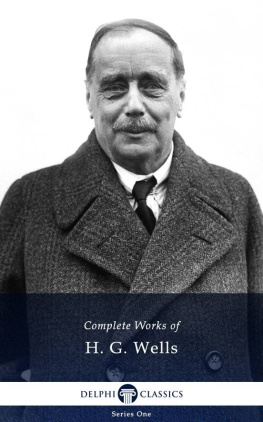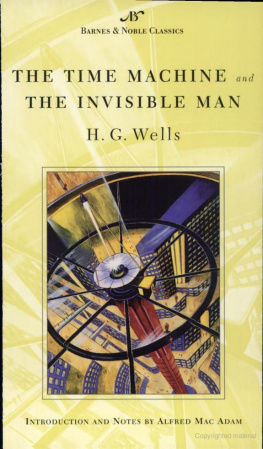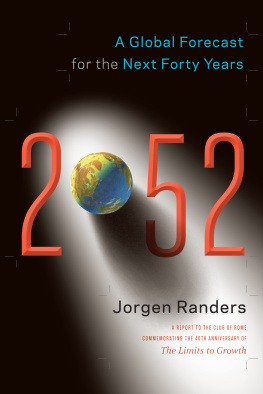I. FORECASTING THE FUTURE
Prophecy may vary between being an intellectual amusement and a serious occupation; serious not only in its intentions, but in its consequences. For it is the lot of prophets who frighten or disappoint to be stoned. But for some of us moderns, who have been touched with the spirit of science, prophesying is almost a habit of mind.
Science is very largely analysis aimed at forecasting. The test of any scientific law is our verification of its anticipations. The scientific training develops the idea that whatever is going to happen is really here nowif only one could see it. And when one is taken by surprise the tendency is not to say with the untrained man, Now, whod ha thought it? but Now, what was it we overlooked?
Everything that has ever existed or that will ever exist is herefor anyone who has eyes to see. But some of it demands eyes of superhuman penetration. Some of it is patent; we are almost as certain of next Christmas and the tides of the year 1960 and the death before 3000 A.D. of everybody now alive as if these things had already happened. Below that level of certainty, but still at a very high level of certainty, there are such things as that men will probably be making aeroplanes of an improved pattern in 1950, or that there will be a through railway connection between Constantinople and Bombay and between Baku and Bombay in the next half-century. From such grades of certainty as this, one may come down the scale until the most obscure mystery of all is reached: the mystery of the individual. Will England presently produce a military genius? or what will Mr. Belloc say the day after to-morrow? The most accessible field for the prophet is the heavens; the least is the secret of the jumping cat within the human skull. How will so-and-so behave, and how will the nation take it? For such questions as that we need the subtlest guesses of all.
Yet, even to such questions as these the sharp, observant man may risk an answer with something rather better than an even chance of being right.
The present writer is a prophet by use and wont. He is more interested in to-morrow than he is in to-day, and the past is just material for future guessing. Think of the men who have walked here! said a tourist in the Roman Coliseum. It was a Futurist mind that answered: Think of the men who will. It is surely as interesting that presently some founder of the World Republic, some obstinate opponent of militarism or legalism, or the man who will first release atomic energy for human use, will walk along the Via Sacra as that Cicero or Giordano Bruno or Shelley have walked there in the past. To the prophetic mind all history is and will continue to be a prelude. The prophetic type will steadfastly refuse to see the world as a museum; it will insist that here is a stage set for a drama that perpetually begins.
Now this forecasting disposition has led the writer not only to publish a book of deliberate prophesying, called Anticipations, but almost without premeditation to scatter a number of more or less obvious prophecies through his other books. From first to last he has been writing for twenty years, so that it is possible to check a certain proportion of these anticipations by the things that have happened, Some of these shots have hit remarkably close to the bulls-eye of reality; there are a number of inners and outers, and some clean misses. Much that he wrote about in anticipation is now established commonplace. In 1894 there were still plenty of sceptics of the possibility either of automobiles or aeroplanes; it was not until 1898 that Mr. S.P. Langley (of the Smithsonian Institute) could send the writer a photograph of a heavier-than-air flying machine actually in the air. There were articles in the monthly magazines of those days proving that flying was impossible.
One of the writers luckiest shots was a description (in Anticipations in 1900) of trench warfare, and of a deadlock almost exactly upon the lines of the situation after the battle of the Marne. And he was fortunate (in the same work) in his estimate of the limitations of submarines. He anticipated Sir Percy Scott by a year in his doubts of the decisive value of great battleships (see An Englishman Looks at the World); and he was sound in denying the decadence of France; in doubting (before the Russo-Japanese struggle) the greatness of the power of Russia, which was still in those days a British bogey; in making Belgium the battle-ground in a coming struggle between the mid-European Powers and the rest of Europe; and (he believes) in foretelling a renascent Poland. Long before Europe was familiar with the engaging personality of the German Crown Prince, he represented great airships sailing over England (which country had been too unenterprising to make any) under the command of a singularly anticipatory Prince Karl, and in The World Set Free the last disturber of the peace is a certain Balkan Fox.
In saying, however, here and there that before such a year so-and-so will happen, or that so-and-so will not occur for the next twenty years, he was generally pretty widely wrong; most of his time estimates are too short; he foretold, for example, a special motor track apart from the high road between London and Brighton before 1910, which is still a dream, but he doubted if effective military aviation or aerial fighting would be possible before 1950, which is a miss on the other side. He will draw a modest veil over certain still wider misses that the idle may find for themselves in his books; he prefers to count the hits and leave the reckoning of the misses to those who will find a pleasure in it.
Of course, these prophecies of the writers were made upon a basis of very generalised knowledge. What can be done by a really sustained research into a particular questionespecially if it is a question essentially mechanicalis shown by the work of a Frenchman all too neglected by the trumpet of fameClement Ader. M. Ader was probably the first man to get a mechanism up into the air for something more than a leap. His Eole, as General Mensier testifies, prolonged a jump as far as fifty metres as early as 1890. In 1897 his Avion fairly flew. (This is a year ahead of the date of my earliest photograph of S.P. Langleys aeropile in mid-air.) This, however, is beside our present mark. The fact of interest here is that in 1908, when flying was still almost incredible, M. Ader published his Aviation Militaire. Well, that was eight years ago, and men have been fighting in the air now for a year, and there is still nothing being done that M. Ader did not see, and which we, if we had had the wisdom to attend to him, might not have been prepared for. There is much that he foretells which is still awaiting its inevitable fulfilment. So clearly can men of adequate knowledge and sound reasoning power see into the years ahead in all such matters of material development.
But it is not with the development of mechanical inventions that the writer now proposes to treat. In this book he intends to hazard certain forecasts about the trend of events in the next decade or so. Mechanical novelties will probably play a very small part in that coming history. This world-wide war means a general arrest of invention and enterprise, except in the direction of the war business. Ability is concentrated upon that; the types of ability that are not applicable to warfare are neglected; there is a vast destruction of capital and a waste of the savings that are needed to finance new experiments. Moreover, we are killing off many of our brightest young men.














